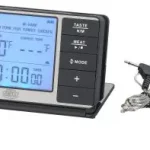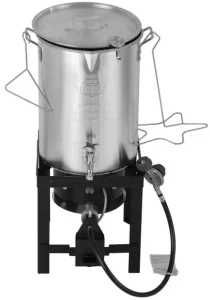
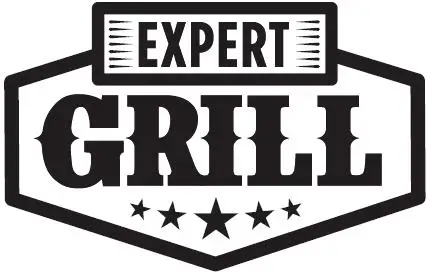
EG 30QT TURKEY FRYER
Assembly Instructions & User’s Manual
ModelXG20-105-002-01
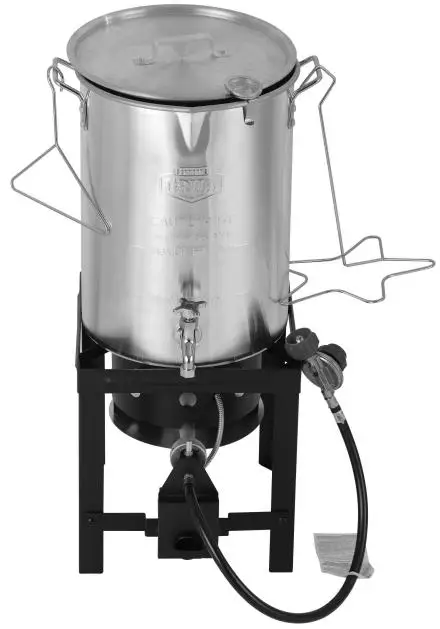
Tools Required:
- Screwdriver (not included)
- Adjustable wrench(not included)
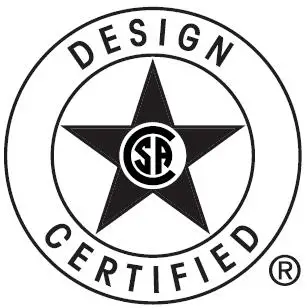
For Outdoor Use Only
- This instruction manual contains important information necessary for the proper assembly and safe use of the appliance.
- Read and follow all warnings and instructions before assembling and using the appliance.
- Follow all warnings and instructions when using the appliance.
- Keep this manual for future reference.
If you experience any problems with your FRYER, DO NOT RETURN THE PRODUCT TO THE STORE, please call 1-866-206-0888 for assistance. 8:00 am to 4:00 pm CENTRAL time, Monday to Friday.
![]() DANGER
DANGER ![]()
If you smell gas:
- Shut off gas to the appliance.
- Extinguish any open flame.
- If odour continues, keep away from the appliance and immediately call the fire department.
Failure to follow these instructions could result in fire or explosion which could cause property damage, personal injury or death.
![]() DANGER
DANGER ![]()
- Never operate this appliance unattended.
- Never operate this appliance within 10 ft (3.0m) of any structure, combustible material or other gas cylinder.
- Never operate this appliance within 25 ft (7.5 m) of any flammable liquid.
- Do not fill cooking vessel beyond maximum fill-line.
- Never allow oil or grease to get hotter than 400°F or 204 °C. If the temperature exceeds 400°F (204 °C) or if oil begins to smoke, immediately turn the burner or gas supply OFF.
- Heated liquids remain at scalding temperatures long after the cooking process. Never touch cooking appliance until liquids have cooled to 115°F (46°C) or less.
- If a fire should occur, keep away from the appliance and immediately call your fire department. Do not attempt to extinguish an oil or grease fire with water.
Failure to follow these instructions could result in fire, explosion or burn hazard which could cause property damage, personal injury or death.
PROP 65 WARNING
![]() WARNING: This product can expose you to chemicals including lead, which is known to the State of California to cause cancer, birth defects, or other reproductive harm. For more information go to www.P65Warnings.ca.gov
WARNING: This product can expose you to chemicals including lead, which is known to the State of California to cause cancer, birth defects, or other reproductive harm. For more information go to www.P65Warnings.ca.gov
![]() WARNING
WARNING ![]()
This Appliance is not intended for commercial use.
Safety Symbols
The symbols and boxes shown below explain what each heading means. Read and follow all of the messages found throughout the manual.
![]() DANGER
DANGER ![]()
DANGER: Indicates an imminently hazardous situation that, if not avoided, will result in death or serious injury.
![]() WARNING
WARNING ![]()
WARNING: Indicates a potentially hazardous situation which, if not avoided, will result in death or serious injury.
![]() CAUTION
CAUTION ![]()
CAUTION: Indicates a potentially hazardous situation or unsafe practice which, if not avoided, may result in minor or moderate injury.
![]() WARNING
WARNING ![]()
- Never leave the appliance unattended. Keep children and pets away from the appliance at all times.
- The use of alcohol, prescription, or non-prescription drugs may impair the consumer’s ability to properly assemble or safely operate the appliance.
- This appliance shall not be used on or in any apartment or condominium balcony or deck.
- This appliance is for OUTDOOR USE ONLY. DO NOT use in building, garage, or any other enclosed area.
- This appliance is not intended to be installed in or on a boat. This appliance is not intended to be installed in or on recreational vehicles.
- This appliance is not intended for and should never be used as a heater.
- When cooking, the fryer/boiler must be on a level, stable non-combustible surface in an area clear of combustible material. Asphalt surface (blacktop) may not be acceptable for this purpose.
- Keep the fuel supply hose away from any heated surface.
- When cooking with oil or grease, the thermometer provided MUST be used. Follow instructions in this manual for proper installation and use of the thermometer. If the thermometer supplied with this fryer has been lost or damaged, A replacement thermometer must be one specified by the appliance manufacturer.
- If the temperature exceeds 400 °F (204°C) or if oil begins to smoke, immediately turn the burner or gas supply OFF and wait for the temperature to decrease to less than 350°F (177°C) before relighting the burner according to the manufacturer’s instructions. If there is a lid (cover), do not remove it.
- When cooking with oil or grease, have a type BC or ABC fire extinguisher readily available. In the event of an oil or grease fire do not attempt to extinguish with water. Immediately call the fire department. A Type BC or ABC fire extinguisher may, in some circumstances contain the fire.
- Never overfill the cooking vessel with oil, grease, or water. Follow instructions in this manual for establishing proper oil, grease, or water levels.
- Introduction of water or ice from any source into the oil/grease may cause overflow and severe burns from hot oil and water splatter. When frying with oil/grease, all food products MUST be completely thawed and towel-dried before being immersed in the fryer.
- Do not place an empty cooking vessel on the appliance while in operation. Placing an empty cooking vessel on the appliance while in operation will result in melting the cooking vessel. Use caution when placing anything in cooking vessel while the appliance is in operation.
- In the event of rain, snow, hail, sleet, or other forms of precipitation while cooking with oil or grease, cover the cooking vessel immediately and turn off appliance burners and gas supply. Do not attempt to move the appliance or cooking vessel.
- Do not move the appliance when in use. Allow the cooking vessel to cool to 115°F (46°C) before moving or storing.
- Do not leave the appliance unattended, keep children and pets away from the appliance at all times.
![]() WARNING
WARNING ![]()
Installation Safety Precautions.
- Use appliance only with LP (liquid propane) gas and the regulator/valve assembly supplied.
- Installation must conform with local codes or, in the absence of local codes, with the National Fuel Gas Code, ANSI Z223.1/NFPA 54, Storage and Handling of Liquefied Petroleum Gases, ANSI/NFPA 58; or Natural Gas and Propane Installation Code, CSA B1 49.1. Propane Storage and Handling, CSA B149.2.
- This appliance shall be used only outdoors, and shall not be used in a building, garage or any other enclosed area.
- Use appliance at least 10 ft(3m) from any wall or surface. Do not use under overhead construction. Maintain at least 10 ft(3m) clearance from combustible material such as pilot lights on water heaters, electrical appliances that are plugged in, etc. Never use under balconies made of wood or ANY overhead construction.
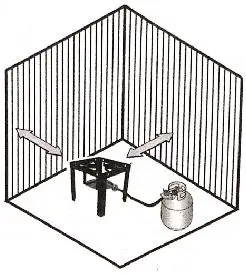
- Before opening LP tank valve, check the coupling nut for tightness. When appliance is not in use, turn off control knob and LP tank valve.
- Never move appliance while in operation or still hot.
- If you notice grease or other hot material dripping from appliance onto valve, hose, or regulator, turn off gas supply at once. Determine the cause, correct, clean and inspect valve, hose, and regulator before continuing. Perform a leak test.
- The regulator may make a humming or whistling noise during operation. This will not affect safety or use of appliance.
- Clean and inspect the regulator and hose assembly each time you use the appliance. If there is evidence of abrasion, wear, cuts or leaks, the regulator and hose assembly must be replaced prior to the appliance being put into operation.
![]() WARNING
WARNING ![]()
- Never use a cooking vessel larger than 30 qts., diameter greater than 11-3/4 inches, and taller than 15-1/2 inches.
- Never fill pot above upper fill line. Oil can splatter, causing staining or discoloration to ground surface.
- Never place empty cooking vessel on the appliance while in operation. Use caution when placing anything in the cooking vessel while the appliance is in operation.
- Never move the appliance when in use. Allow the pot to cool before moving or storing.
- Never leave the appliance unattended. Keep children and pets away from the appliance at all times.
- This appliance is not intended for and should never be used as a heater.
- Never operate appliance with LP tank out of correct position specified in assembly instructions.
- Always close LP tank valve and remove coupling nut before moving LP tank from specified operating position.
- Appliance shall not be used for commercial cooking.
- This appliance will be hot during and after use. Use insulated oven mitts or gloves for protection from hot surfaces or splatter from cooking liquids.
- Avoid bumping or impacting the appliance to prevent spillage or splashing of hot cooking liquid.
- Never drop food or accessories into hot cooking liquid. Lower food and accessories slowly into the cooking liquid in order to prevent splashing or overflow. When removing food from the appliance, care should be taken to avoid burns from hot cooking liquids.
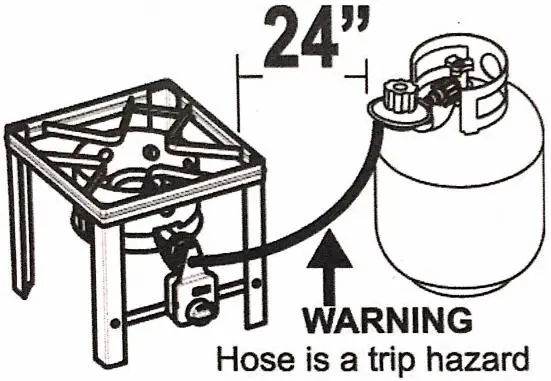
![]() DANGER
DANGER ![]()
- The safety relief valve on the LP tank could activate the releasing of gas and cause an intense fire with risk of death or serious injury. Therefore, follow instructions bulleted below exactly.
(a) Do not store a spare LP-gas cylinder under or near this appliance.
(b) Never fill the cylinder beyond 80 percent full. and
(c) If the instructions in (A) and (B) are not followed exactly, a fire causing death or serious injury may occur. - If you see, smell, or hear escaping gas, immediately get away from the LP tank/ appliance and call your fire department.
- All spare LP tanks must have safety caps installed on the LP tank outlet.
LP Tank Removal, Transport, and Storage
- Turn OFF all control knobs and LP tank valve. Turning coupling nut counterclockwise by hand only— do not use tools to disconnect. “Place dust cap on cylinder valve outlet whenever the cylinder is not in use. Only install the type of dust cap on the cylinder valve outlet that is provided with the cylinder valve. Other types of caps or plugs may result in leakage of propane.”
- A disconnected LP tank in storage or being transported must have a dust cap installed as shown. Do not store an LP tank in enclosed spaces such as a carport, garage, porch, covered patio, or other building. Never leave an LP tank Valve inside a vehicle which may become overheated by the sun.
- Cylinders must be stored outdoors out of the reach of children and shall not be stored in a building, garage, or any other enclosed area
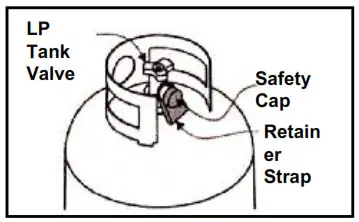
LP Tank
The LP tank used with your appliance must meet the following requirements:
- Purchase LP tanks only with these required measurements: 12″(30.5cm)(diameter)x18″(45.7cm)(tall) with 20lb.(9kg) capacity maximum.
- The LP-gas supply cylinder to be used must be constructed and marked in accordance with the specifications for LP-gas cylinders of the US Department of Transportation (DOT) or the National Standard of Canada, CAN/CSA-B339, Cylinders, Spheres and Tubes for the Transportation of Dangerous Goods.
LP tank valve must have:
- Type 1 outlet compatible with regulator or appliance.
- Safety relief valve.
- UL listed Overfill Protection Device (OPD). This OPD safety feature is identified by a unique trianglar handwheel. Use only tanks equipped with this type of valve.
- LP tank must be arranged for vapor withdrawal and include collar to protect LP tank valve.
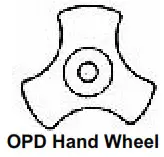
LP (Liquefied Petroleum Gas)
- LP gas is non toxic, odorless, and colorless when produced. For your safety, LP gas has been given an odor (similar to rotten eggs) so that it can be smelled.
- LP gas is highly flammable and may ignite unexpectedly when mixed with air.
LP Tank Filling
- Use only licensed and experienced dealers.
- LP dealer must purge tanks before filling.
- Dealer should NEVER fill LP tank more than 80% of LP tank volume. Volume of propane in tanks will vary by temperature.
- A frosted-covered regulator indicates gas overfill. Immediately close LP tank valve and call LP gas dealer for assistance.
- Do not release liquid propane (LP) gas into the atmosphere. This is a hazardous practice.
- To remove gas from LP tank, contact an LP dealer or call a local FIRE DEPARTMENT for assistance. Check the telephine directory under ” GAS Companies” for nearest certified LP dealers.
LP Tank Exchange
- Many retailers that sell appliances offer you the option of replacing your empty LP tanks through an exchange service, use only those reputable exchange companies that inspect, precision fill, test, and certify their cylinders. Exchange your tank only for an OPD safety feature-equipped tanks as described in the “LP tank” section of this manual.
- Always keep new and exchanged LP tanks in upright position during use, transit, or storage.
- Leak test new and exchanged LP tanks BEFORE connecting to appliance.
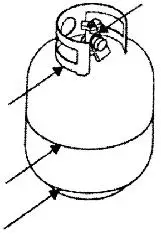
LP Tank Leak Test
For your safety
- Leak test must be repeated each time LP tank is exchanged or refilled.
- Do not smoke during leak test.
- Do not use an open flame to check for the gas leaks.
- LP tank must be leak checked outdoors in well-ventilated area, away from open flames or sparks.
Use a clean paint brush and 50/50 soap and water solution. Use mild soap and water. Do not use household cleaning agents. Damage to gas train components can result. Brush soapy solution onto all metal seams and entire valve area.
![]() DANGER
DANGER ![]()
If “growing” bubbles appear, do not use or move the LP tank. Contact an LP gas supplier or your fire department.
Connecting Regulator to the LP Tank
- Place LP tank on a secure, level, and stable surface.
- Turn control knob to the OFF position.
- Turn LP tank OFF by turning hand wheel clockwise to a full stop.
- Remove the protective cap from the LP tank valve. Always use dust cap and strap supplied with valve.
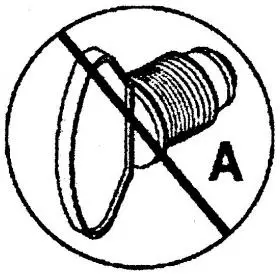 Do not use a POL transport plug(A) (plastic part with external threads)! It will defeat the safety feature of the valve
Do not use a POL transport plug(A) (plastic part with external threads)! It will defeat the safety feature of the valve - Hold regulator, insert nipple (B) into LP tank valve. Hand proper connection to LP tank valve, tighten coupling nut, holding regulator in a straight line (C) with LP tank valve so as not to cross thread the connection.
- Turn the coupling nut clockwise to tighten to a full solid stop. The regulator will seal on the back-check feature in the LP tank Nipple must be centered into the LP tank valve. valve, resulting in some resistance. An additional one-half to three-quarters turn is required to complete connection.
TIGHT BY HAND ONLY— DO NOT USE TOOLS.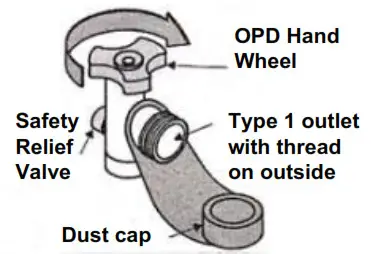
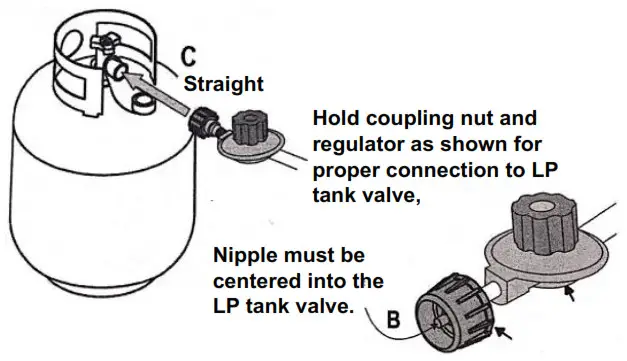 NOTE: If you cannot complete connection, disconnect regulator and repeat step 5and 6. If you are still unable to complete the connection, do not use this regulator!
NOTE: If you cannot complete connection, disconnect regulator and repeat step 5and 6. If you are still unable to complete the connection, do not use this regulator!
Disconnecting Regualtor to the LP Tank
- Turn control knob of regulator to the OFF position.
- Turn LP tank OFF by turning hand wheel clockwise to a full stop.
- Turn the coupling nut counterclockwise to loosen the connector. Loose by hand only—do not use tools.
- When disconnected, the regulator should be hung on the hook attached to the appliance.
![]() WARNING
WARNING ![]()
- Do not insert any tool or foreign objects into the valve outlet or safety relief valve. You may damage the valve and cause a leak. Leaking propane may result in exposion, fire, severe personal injury, or death.
- Never attempt to attach this appliance to the self-contained LP system of a camper, trailer, or a motor home.
- The pressure regulator and hose assembly supplied with the appliance must be used. Replacement pressure regulator and hose assemblies must be those specified by the appliamce manufacturer.
- Turn off gas at supply cylinder when not in use.
![]() WARNING
WARNING ![]()
- Do not use appliance until leak checked.
- If leak is detected at any time, STOP.
- If you cannot stop a gas leak, immediately close LP tank valve, leave area of appliance, and call LP gas supplier or your fire department!
Leak Testing Valves, Hoses, and Regulator
- Turn all control knob(s) to OFF.
- Be sure regulator is tightly connected to LP tanks.
- Completely open LP tank valve by turning hand wheel counterclockwise. If you hear a rushing sound, turn gas off immediately. There is a major leak at the connection. Correct before proceeding.
- Brush soapy solution onto indicated connections shown below in A and B.
- If “growing” bubbles appear, there is a leak. Close LP tank valve immediately and retighten connections. If leaks cannot be stopped, do not try to repair. Call for replacement parts. Order new parts by giving the serial number, model, and name of items needed to the Customer Service Center at 1-866-206-0888 or email at [email protected]. Use only replacement parts specified by manufacturer.
- Always close LP tank valve after performing tank leak test by turning hand wheel clockwise.
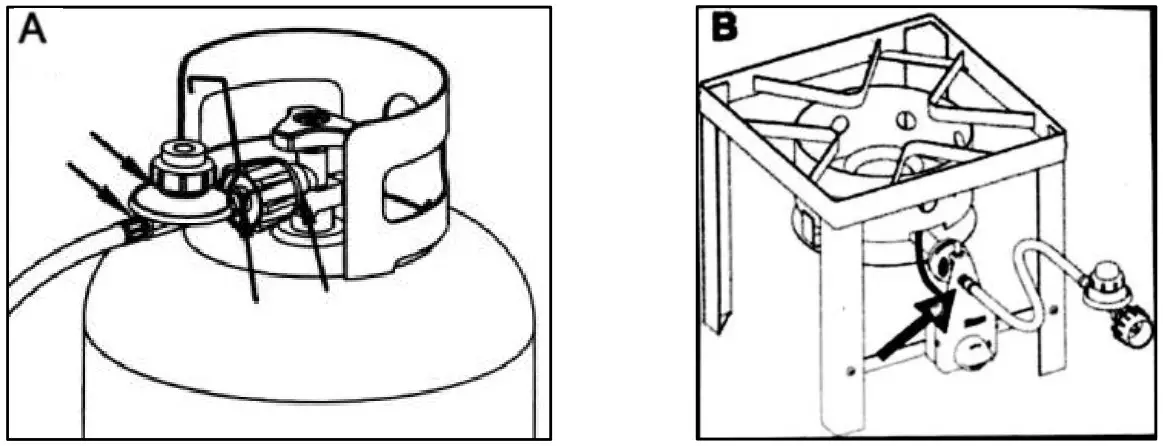
Lighting Instructions
Noto: Do not lean over LP cooker while lighting.
| Step | Procedure | Illustration |
| 1 | Read all instructions before lighting. | |
| 2 | Turn regulator control valve to OFF position. | |
| 3 | Fully turn timer control knob clockwise. | |
| 4 | Fully open LP tank valve. | |
| 5 | Light match and place it over burner. Tip: Wooden kitchen match works best. |
|
| 6 | PRESS and continually HOLD down push button of safety valve while slowly turning ON the regulator control valve. Continually hold down the push button of the safety valve. DO NOT stand with head or arms over cooker. | |
| 7 | After burner is lit, continue to HOLD the push button for 10 seconds and then release. Holding Hold the Push push button of safety valve for less than 10 button of safety seconds will cause burner flame to go out. | |
| 8 | If ignition does not occur in 5 seconds, turn the regulator and LP tank valve off, wait 5 minutes, and repeat the lighting procedure. | |
| 9 | Check the position of thermocouple, make sure the flame has full contact with the thermocouple. Note: If thermocouple does not have full contact with flame, unit will not stay it. Adjust the length of the thermocouple with two brass nuts as shown in the figure,It needs to be about 1.2 inch from L-type thermocouple bracket. |
|
| 10 | Cycle time for timer is around 15 minutes. If the timer is not reset within around 15 minutes, the burner will shut OFF automatically. If this occurs, please follow lighting instructions and continue to cook. | |
![]() CAUTION
CAUTION ![]()
If burner does not light OR if burner flame is accidentally extinguished, turn knob to OFF, wait 5 minutes, try again. If the burner does not ignite with valve open OR if burner flame accidentally extinguished after lighting, gas will continue to flow out of the burner and could accidentally ignite with risk of injury.
Burner Flame Check
- Light Burner, rotate regulator knob from HIGH to LOW. You should see a smaller flame in LOW position than seen on HIGH. Always check flame prior to each use. The air damper mounted on the back of your burner helps to control the amount of primary air that mixes with the LP gas. A blue flame with little or no yellow flame provides the best heat. Adjust the air damper by turning it clockwise or counterclockwise until the desired flame is achieved.
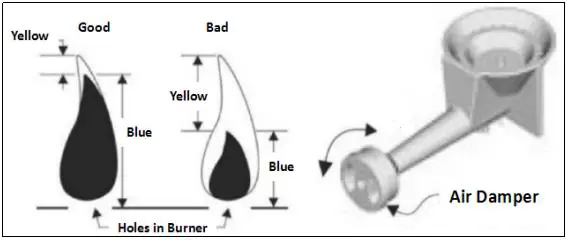
Turning LP Cooker Off
- Turn all knobs to OFF position, turn LP tank OFF by turning hand-wheel clockwise to a full stop.
Hose Check
- Cleaning and inspection of pressure regulator and hose assembly prior to use.
- Before each use, check to see if there is evidence of abrasion, water, cuts, or leaks, the hose must be replaced prior to the appliance being put into operation. The replacement hose assembly shall be that specified by the manufacturer.
Cleaning the Burner
![]() CAUTION
CAUTION ![]()
Checking and cleaning burner/venture tubes for insect nests. A clogged tube can lead to fire beneath the appliances. Spiders’ nests or wraps’ mud inside the burner may cause fire at the air damper. If a fire occurs, immediately turn off gas supply at LP tank valve.
Note: Spiders and small insects can spin webs and build nests inside the burner. This especially occurs in late summer and fall before frost when spiders are most active. These nests can obstruct gas flow and cause a fire in and around the burner and orifice. Such a fire can cause operator injury and serious damage to the appliance. To help prevent a blockage and ensure full heat output, clean and inspect burner tube often (once ortwice a month). NOTE: Water or air pressure will not normally clear a spider web.
Steps for Cleaning the Burner:
- Remove orifice/hose from the burner.
- Look inside the burner tube for nests, webs, or mud.
- To remove the above obstructions, use an accessory flexible venture brush or bend a small hook on one end of a long flexible wire such as the one shown in small picture.
- Inspect and clean the burner if needed.
- Reattach orifice/hose to burner.
The burner should be removed and cleaned occasionally. When the burner is reassembled, align the cone thread of the safety valve to the center line of the burner, then tighten the burner. Doing this is critical for maximum performance and efficiency.
Cleaning and Maintenance
- Keep appliance area clear and free from combustible materials, gasoline, and other flammable vapors and liquids.
- Do not block holes in bottom or sides of appliance.
- Check burner flames regularly.
- Use appliance only in well-ventilated space. NEVER use in enclosed space such as carport, garage, porch, covered patio, or under ANY overhead construction.
- Completely thaw meat and poultry prior to placing in hot oil.
- To minimize splattering, dry surfaces of meat and poultry prior to placing in hot oil.
- When LP tank is connected to appliance, store outdoors in well-ventilated space and out of reach of children.
- Store appliance indoors ONLY if LP tank is turned off, disconnected, and removed from appliance then stored outdoors.
- Keep the appliance clear and free from gasoline and other flammable vapors and debris.
- Do not obstruct the flow of combustion and ventilation air.
- Keeping the ventilation opening(s) of the LP tank enclosed and free and clear of debris.
- Clean all cooking surfaces of vessels, aluminum pots, and pans with warm, soapy water and a nylon cleaning pad to avoid oxidation, corrosion, and rusting.
![]() CAUTION
CAUTION ![]()
All cleaning and maintenance should only be done when the appliance is cool and with the fuel supply turned off at the LP tank. DO NOT clean any part in a self-cleaning oven. The extreme heat will damage the finish.
Correct care and maintenance will keep your appliance operating smoothly. Clean regularly as determined by the amount of use. NOTE: Clean the entire appliance each year and tighten all hardware on a regular basis (1-2 times a year or more depending on usage). Cleaning should be done where detergents won’t harm patio, lawn, or the like.
Suggested Cleaning Materials:
- Mild dish washing liquid detergent l Hot water
- Wire brush l Paper clip l Nylon cleaning pad
- Soft brass-bristled brush
Component Cleaning:
- Burner: Use wire brush loosen corrosion from burner exterior. Clean clogged gas port holes with an opened paper clip. Replace corroded or damaged burners that would emit excess gas.
- Cooking surfaces, pots, and pans: Clean the cooking surface with soapy water and a nylon cleaning pad.
Product Diagram
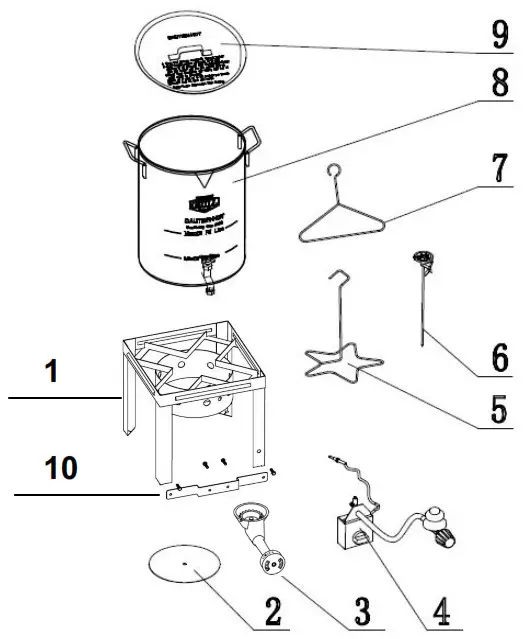
Hardware List
| A | Bolt M6 – 4pcs (packaging in the plastic bag) |
 |
| B | lock nut M5 -1pc ; Flange nut M5 -1pc (Pre-assembled on the Burner) |
 |
| C | Hexagon nut M8 – 2pcs (Pre-assembled on the thermocouple of Timer Control Box) |
 |
Assembly Instruction
| 1. Attach Burner (3) to Automatic Shut Off Valve in the Timer Control Box (4) by turning the burner clockwise. Do not fully tighten burner to the valve, tighten until 3 threads remain visible on the valve Note: Proper connection is critical for correct operation of unit |
 |
| 2. Unscrew the pre-assembled M5 lock nut and M5 flange nut (B) from the threaded pin of the burner (3). Insert burner between wind shield and burner support bar. Insert the threaded pin of burner through the hole of the support bar, and screw a M5 flange nut (B). Don’t tighten it completely. | 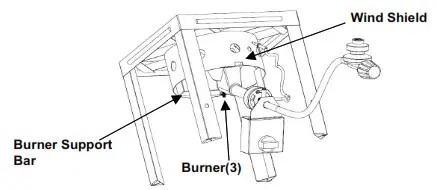 |
| 3. Unscrew a pre-assembled M8 hexagon nut firstly. Insert thermocouple through the hole of Wind Shield and Thermocouple Bracket. Screw the M8 hexagon nut onto the thermocouple to fix the thermocouple tightly, and make sure the end of the thermocouple sticking out about 1.2 inch from L-type thermocouple bracket. |
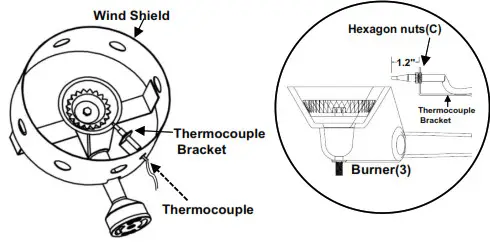 |
| 4. Align the Timer Support Bar (10), and fix it to legs of stand with 2pcs M6 Bolts(A) . Insert the Heat Shield (2) onto threaded pin of the Burner then tighten with a M5 lock nut(B). Align the Timer Control Box (4) to the Timer Control Box Support Bar (10) and fix it with 2pcs M6 Bolts (A). Tighten all bolts and nuts. Now, Steel Stand has been assembled. |
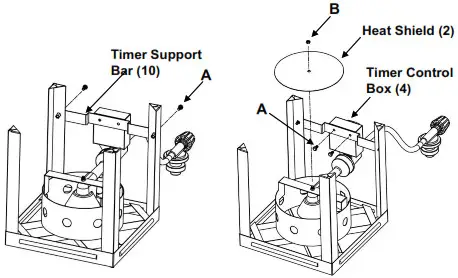 |
| 5. When transporting or storing LP cooker, detach the tank firstly, then hook the regulator onto the burner or cooker stand to prevent damage to regulator. | 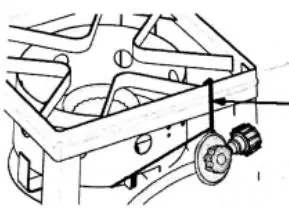 |
Using Your Thermometer
Check the thermometer before each use by inserting into a pot of boiling water and ensuring that it registers approximately 212°F +/- 20 °F (100°C+/-10°C). If it does not function properly, obtain a replacement thermometer soecified by the manufacturer before using the appliance. Prior to lighting, position thermometer clip so that at least 2.75″ of thermometer tip is submerged in oil. Reposition thermometer as necessary to cook. Continue to use thermometer until burner is turned off.
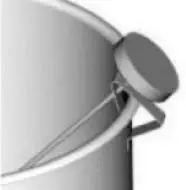 The following safety measures are recommended when using your fry set.
The following safety measures are recommended when using your fry set.
LOCATION MATTERS
Select a safe place to fry your turkey. It should be in an open area, outsode, and on a cement or brick surface. Place the liquid propane gas tank and fryer so that if any wind blows on a wooden deck. Keep a minimum clearance of 10 feet from the sides, front, and back of the fryer to any construction.
PREPARE PROPERLY
- Remove and discard any thermometer buttons, leg holders, and giblet packs contained inside the completely thawed turkey. DO not attempt to fry a frozen or partially frozen turkey. Ensure your turkey is completely thawed prior to proceeding. The USDA recommends thawing 24 hours (1 day) for every 4-5 pounds in the refrigerator.
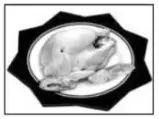
- Insert the T-Star stand up through the cavity of turkey so that the legs are at the top.
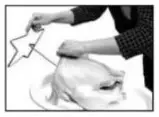
Determining the maximum fill level when using a vessel without a maximum fill line:
- Place the turkey (or other food product) on the lifter.
- Place the turkey and lifter into the empty pot.
- Fill the pot with water just until the turkey is completely submerged. There must be a minimum of 3 inches or 8 cm between the water level and top of the pot.
- Remove the turkey from the pot and either mark the water level on the side of the pot or measure the amount of water in the pot.
- Remove the water and completely dry the pot and the turkey.
- This is the amount of peanut oil the pot is to be filled with to cook the turkey.
- Use marinade by injecting it into the thicker areas of the turkey breasts andthighs.
- To use, load the injector with marinade and insert the needle into the turkey. Withdraw the needle slowly while pushing the plunger, minimizing largepockets of marinade and spreading it more evenly. Discard any unused marinade.
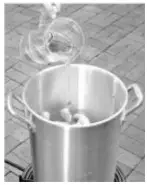
- Completely pat dry the inside and outside surfaces of the turkey. This is veryimportant as it reduces the splattering of oil. After patting the turkey dry, addherb rubs or seasonings to the skin.
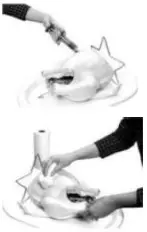
FRY WITH CARE
- Check your hose at both ends for proper connection. Also, place the LP tank and hose so that they are not located directly next to the fryer (see photo). Center the pot over the burner on the cooker.
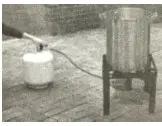
- Fill the pot to the mark with peanut oil. Do not place an empty cooking vessel on the appliance while in operation. Placing an empty cooking vessel on the appliance while in operation will result in melting the cooking vessel. Use caution when placing anything in cooking vessel while the appliance is in operation.
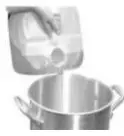
- Light the burner unit and heat the oil to 325″F. Never leave the fryer unattended at any time.
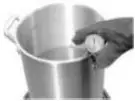
- Check the oil using a deep fry temperature gauge. If it has reached 325°F, you are ready to start deep frying. Monitor the temperature throughout the frying process to maintain 325°F never let the oil temperature get hotter than 325°F.
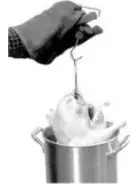
- If the oil exceeds 400°F or if the oil begins to smoke, immediately turn the burner off.
- Wear long, insulated, flame- -retardant gloves to protect your hands and arms. Use the lift handle to slowly lower the turkey into the oil. Pause at several points before reaching the bottom of the pot.
- Never drop food or accessories into hot cooking liquid. Lower food and accessories slowly into the cooking liquid in order to prevent splashing or overflow. When removing food from the appliance, care shall be taken to avoidburns from hot cooking liquids.
- Adjust the burner to maintain 325’F. Monitor the fryer during the entire process to assure a safe frying experience. Do not leave fryer unattended.
- Cook until a golden brown color is achieved. Normal cooking time is3 1/2minutes per pound.
![]() DANGER
DANGER ![]()
- Do not fill past the maximum fill line marked on the pot.
- An oil overflow may occur resulting in a fire which could cause property damage, personal injury, or death. Follow directions above to prevent this.
- Do not place an empty cooking vessel on the appliance while in operation. Placing an empty cooking vessel on the appliance while in operation will result in melting the cooking vessel. Use caution when placing anything in cooking vessel while the appliance is in operation.
![]() WARNING
WARNING ![]()
Avoid bumping of or impacting with the appliance to prevent spillage or splashing of hot cooking liquid. Introduction of water or ice from any source into the oil/grease may cause overflow and severe burns from hot oil and water splatter. When frying with oil/grease, all food products MUST be completely thawed and towel dried before being immersed in the fryer.
- Remove the turkey from the oil with care and place it on paper towels in an aluminum pan.
- Using a meat thermometer, check for an internal meat temperature of 180°F.
- Remove turkey fryer accessory and allow the turkey to “rest” for 15 minutes to allow the juices to settle into the turkey. Slice and serve!
![]() WARNING
WARNING ![]()
FALURE TO FOLLOW THESE INSTRUCTIONS AND WARNINGS COULD RESULT IN FIRE OR EXPLOSION WHICH COULD CAUSE PROPERTY DAMAGE, PERSONAL INJURY,OR DEATH.
FOR OUTDOOR USE ONLY! ALWAYS AND UNDERSTAND THE OPERATION MANUAL THAT ACCOMPANIES YOUR COOKER BEFORE USING PRODUCT.
READ AND UNDERSTAND ALL OUTDOOR COOKER SAFETY PRECUTIONS ON THE BACK OF THIS SHEET BEFORE USING PRODUCT.
ALWAYS ALLOW COOKING LIQUID TO COOL BEFORE OPERATING VALVE(BELOW 100 DEGREES F(38 DEGREES C). COOKING LIQUID CAN REMAIN DANGEROUSLY HOT HOURS AFTER USE.
ALWAYS USE A THERMOMETER TO CHECK TEMPERATURE OF THE COOKING LIQUID BEFORE OPERATING THE SPIGOT.
OPERATING INSTRUCTIONS FOR SPIGOT POT:
- Before adding cooking liquid, turn valve clockwise until it stops. This is the OFF/CLOSED position. Also, make sure that the removable cap is attached and tight at the base of the spigot.
- NEVER open the valve during use or before the oil has cooled below 100°F (38°C).
- Upon completion of cooking, allow cooking liquid to cool before operating the valve (below 100°F (38°C)).
- To operate valve, remove the cap at the base of the spigot. To open spigot, turn counterclockwise to the ON/OPEN position.
- Always close the spigot valve after cleaning and attach the cap back to the end of the spigot.
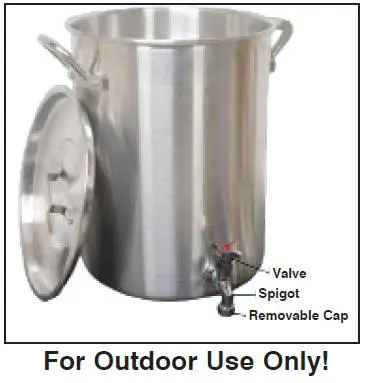
| PROBLEM | POSSIBLE CAUSE | CORRECTIVE ACTION |
| The burner dose not light up. | The connection between the regulator and LP tank are not in good condition. | Check and make sure the regulator coupling nut is tightened to the LP tank valve. |
| The LP tank valve and regulator control valve do no open. | The regulator control valve and LP tank valve is open during normal operation. The regulator control valve is opened in clockwise direction and the LP tank valve is opened in counter-clockwise direction. | |
| The LP tank is empty. | Check and make sure the LP tank is filled with fuel. | |
| Push button of safety valve was ti01 pushed down. | Press and fully hold down push button of safety valve after the lighted match is placed on the burner. | |
| The burner does not stay ht. | The push button on safety valve was not fully pushed down for at least 10 seconds. | Fully hold down the push button on safety valve at least 10 seconds and then release. |
| Timer is not activated. | Fullyturn the timer control knob clockwise. | |
| The thermocouple is not in direct flame path of burner. | Ensure the thermocouple is assembled in right position and the nut is tightened on the thermcouple. (See Assembly Instruction- step 2 for detail) Make sure the flame has full contact with the thermocouple. | |
| High wind condition. | If wind blows out flame, gas supply will be cot off. Move out of wind and restart. | |
| Timer has completed its cycle. | Each cycle of timer is 15 minutes. after 15 minutes. the burner will go off automatically. Please re-set the timer. |
|
| The oil is not reaching desired temperature. | The food is not fully defrosted. | Do not attempt to fry a frozen or partically frozen turkey or food. Ensure the turkey or food is completely thawed prior to proceeding. |
| The regulator control valve is not fully opened. | Fully open the regulator control valve. The regulator control valve is opened Si clockwise direction and the LP tank valve is opened in counter-clockwise direction. | |
| Overfilled Protection Device (OPD) on tank has been tripped. | Overfilled Protection Device (OPD) has been activated. To reset. him off regulator control valve and LP tank valve. Disconnect the regulator from the LP tank and wait one minute. Reconnect the regulator control valve to the LP tank valve and slowly open the LP tank valve until it is fully open. |
LIMITED WARRANTY
- Manufacturer warrants this Product to be free from defects in workmanship and materials for a period of one year from the date of purchase, PROVIDED claims are submitted, in What with proof of purchase.
- If any part of this item fails because of a manufacturing defect within the Limited Warranty Period, Manufacturer offers to replace such part(s) provided that such parts have not been improperly repaired, altered, or tampered with orsubject to misuse, abuse, or exposed to corrosive conditions. This Limited Warranty is, however, subject to certain limitations, exclusions, time limits, and exceptions (Hereinafter Conditions”) as listed below. Read these Conditions carefully.
- This Limited Warranty shall be limited to the replacement or repair of any part(s) which Manufacturer determines, after reasonable examination, to have been defective at the time of manufacturing and manufacturer’s obligation(s)shall be limited to replacement, if any, of defective part(s) which shall be shipped at Original Purchaser’s expense to Original Purchaser’s designated shipping address.
- This Limited Warranty is given to and covers the ORIGINAL PURCHASER ONLY and such coverage terminate One year from the date of purchase.
- DAMAGE LIMITATION WARNING: IN NO EVENT SHALL MANUFACTURER BE LIABLE FOR ANYINCIDENTIAL OR CONSEQUENTIAL DAMAGES, INCLUDING (BUT NOT LIMITED To) LOSS OF USE OFTHE PRODUCT, LOSS OF TIME. LOSS OF FOOD, INCONVENIENCE, EXPENSE FOR TRAVEL, TRANSPORTATION LODGING EXPENSES, LOSS BY DAMAGE To PERSONAL PROPERTY OR LOSS OFINCOME, PROFITS OR REVENUE.
- MANUFACTURER’S OBLIGATION: Manufacturer’s liability shall be limited to the delivery of a good, merchantable Product and, if necessary, the repair or replacement, at manufacturer’ s option, of any defective part or unit.
- TRANSFER LIMITATIONS: This Limited Warranty is not assignable or transferable. It covers only theoriginal purchaser.
- RESERVED RIGHT TO CHANGE: Manufacturer reserves the right to make changes or improvements to products it produces in the future without imposing on itself any obligations to install the same improvements in the products it has previously manufactured.
- This Limited Warranty gives the Original Purchaser specific legal rights but there may be other rights whichvary by jurisdiction.
- This warranty does not cover the following items: l Chips or scratches on porcelain or painted surfaces. l Rust or corrosion has not deemed a manufacturing or materials defect. l Discoloration or loss of paint due to handling during assembly, heat, or cleaning products. Paint
may require touch up. l Stainless steel discoloration or corrosion l Consumables such as batteries
IF CUSTOMER SERVICE BECOMES NECESSARY:
- The Original Purchaser is responsible for shipping and handling charges of the returned item(s) and replacement parts if any.
- All parts to be replaced will need to be shipped before replacement items will be sent.
- Follow the Customer Service Representative’s instructions exactly. If a return is necessary, it must be packed carefully and shipped prepaid.
Should you encounter any problems,
CONTACT US FIRST
Ningbo Zhaofeng Cooker Units Co., Ltd
No.2 Heduo Road, Yunlong Town, Yinzhou District, Ningbo 315137, China
Please call 1-866-206-0888 for assistance. 8:00 am to 4:00 pm CENTRAL time, Monday to Friday.
DO NOT return product to the store!
Outdoor Cooker Safety Precautions
![]() WARNING
WARNING ![]()
FAILURE TO FOLLOW THESE INSTRUCTIONS AND WARNINGS COULD RESULT IN FIRE, EXPLOSION, BURN HAZARD, OR CARBON MONOXIDE POISONING WHICH COULD CAUSE PROPERTY DAMAGE, PERSONAL INJURY, OR DEATH.
Read and understand the entire Assembly Instructions and Use and Care Manual before using this product. If you lose your manual and need a replacement, or have questions, please call 1-866-206-0888 for assistance. 8:00 am to 4:00 pm CENTRAL time, Monday to Friday.
WARNING: This product can expose you to chemicals including lead, which is known to the State of California to cause cancer, birth defects, or other reproductive harm. For more information go to www.P65Warnings.ca.gov
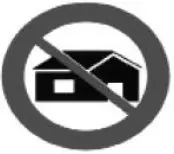 |
USE ONLY OUTDOORS! | 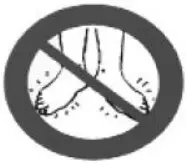 |
ALWAYS wear shoes while cooking. Keep hair and clothing from coming into contact with the cooker while in use or still hot. |
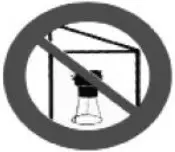 |
DO NOT use under any overhang or roof. Keep a minimum clearance of 10 ft. (3.05m) on all sides of the cooker. | 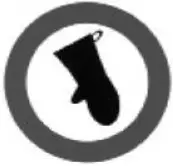 |
ALWAYS wear protective mitts and use extreme caution not to splash hot oil. |
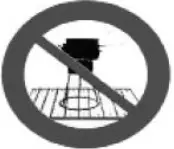 |
DO NOT use on combustible surfaces. | 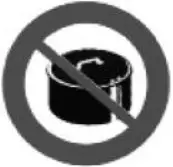 |
NEVER cover the pot while frying or preheating. |
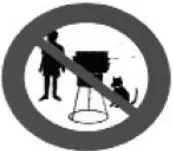 |
ALWAYS keep children, petsand any unauthorized persons away from cooker. | 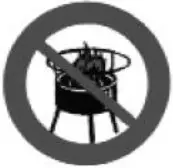 |
ALWAYS turn the burner OFF when ]cooking is completed. |
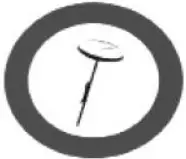 |
ALWAYS use a deep fry thermometerto monitor the temperature of the grease while frying and preheating. | 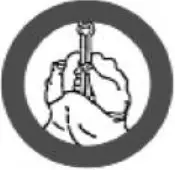 |
ALWAYS thaw and dryfood completely before cooking with oil or grease. |
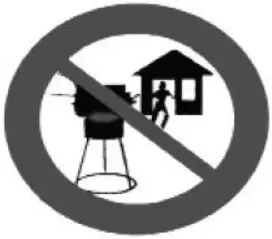 |
NEVER LEAVE COOKER UNATTENDED while in use or still hot. |
